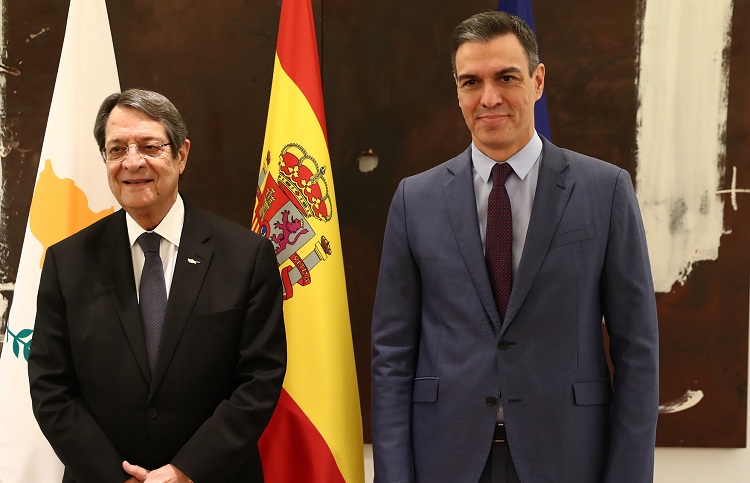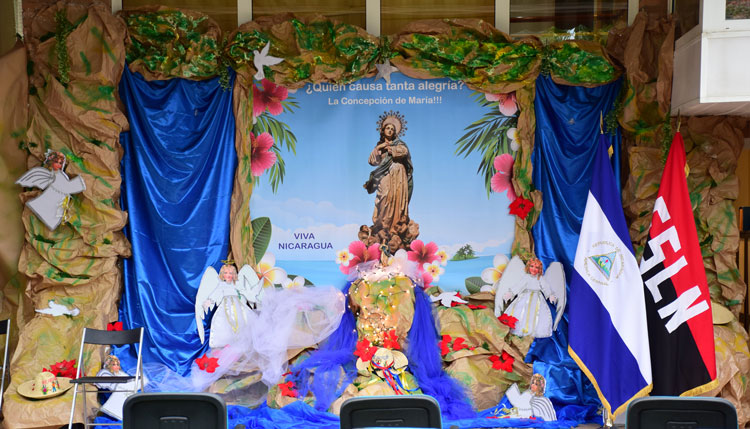The Diplomat
The official visit to Madrid of the President of Cyprus, Nikos Anastasiadis, concluded yesterday with a joint communiqué in which the governments of the two countries defended “a peaceful, stable, secure and prosperous Mediterranean”, supported “the sovereignty and territorial integrity of the countries” and demanded “a comprehensive and viable solution to the Cyprus question, based on a bicommunal and bizonal federation with political equality”.
The visit of Anastasiadis coincided with the unease created in Greece by the recent holding in Ankara of the VII Spanish-Turkish Summit, during which the Presidente of the Government, Pedro Sánchez, offered Spain’s support for the “progressive rapprochement” of Turkey to the European Union and the Turkish President, Recep Tayyip Erdogan, announced that his government wishes to acquire a second aircraft carrier and a series of submarines for its Navy in collaboration with the Spanish company Navantia. The crisis with Greece has been taken advantage of by the PP, whose leader, Pablo Casado, traveled last week to Greece and Cyprus to meet with the Greek Prime Minister, Kyriakos Mitsotakis, and with the President of Cyprus, the also conservative Nikos Anastasiadis. “The PP has always been close to Greece and Cyprus in their claims for territorial integrity, just as they were close to Spain when there have been pro-independence challenges within our nation,” he stated.
Apart from that, the Ankara summit came at a time of sharp disagreements between the EU and Turkey. One of the main sticking points is related to unauthorized drilling by Turkish authorities in the Eastern Mediterranean, which was harshly condemned by Greece and Cyprus and prompted the adoption of sanctions by the EU that were recently renewed until November 2022. Apart from this, Turkey and the EU maintain strong differences over the so-called “Cyprus issue”, a country divided since 1974 between a self-proclaimed Turkish Republic of Northern Cyprus, only recognized by Ankara, and the Republic of Cyprus, a majority Greek-Cypriot entity, with its capital in Nicosia, which does have international recognition and is even listed as a member state of the EU.
The Cypriot President’s day yesterday began at the Moncloa Palace, where he met with Pedro Sanchez, and continued at the Zarzuela Palace, where he was received by King Philip VI, to whom he informed about the latest developments in the “Cyprus issue”, according to the Cypriot Presidency. The meeting was attended by the Secretary of State for the European Union, Juan González-Barba; the Spanish Ambassador to Cyprus, Álvaro Castillo Aguilar; the Cypriot Minister of Foreign Affairs, Nikos Christodoulides; and the Cypriot Ambassador to Spain, Helena Mina. Afterwards, the King offered the Cypriot President a lunch at the Zarzuela Palace.
Joint communiqué
During the meeting between Pedro Sanchez and Nikos Anastasiadis, the two leaders agreed on a joint communiqué – collected by the official websites of the Spanish Government and the Cypriot Presidency – in which both stated that “a peaceful, stable, secure and prosperous Mediterranean constitutes a strategic priority for the EU” and expressed “their support for the sovereignty and territorial integrity of the countries and the sovereign rights of each State and their maritime areas, in accordance with International Law”.
Likewise, Sánchez and Anastasiadis reaffirmed their “strong support for a comprehensive and viable solution to the Cyprus issue, based on a bicommunal and bizonal federation with political equality, as established by UN resolutions and in line with EU principles”. On migration issues and, “from their perspective as Mediterranean countries of first entry”, the two leaders called for “a new Asylum and Migration Pact that would enable the EU to ensure an efficient management of migration flows, based on shared responsibility and effective solidarity”.
On the other hand, the two governments signed three Memorandums of Understanding (MOU) yesterday. The Ministers of Health of Spain, Carolina Darias, and Cyprus, Michael Hadjipantela, agreed to exchange information on pharmaceutical products and multiple transplant procedures, as well as on the promotion of organ donations. Likewise, the Minister of Foreign Affairs, José Manuel Albares, and his Cypriot counterpart, Nikos Christodoulides, held a working breakfast at the Viana Palace during which they discussed economic cooperation in the field of tourism or renewable energy and the establishment of direct flights between Cyprus and Spain, and signed an MOU on political consultations between the respective Ministries of Foreign Affairs and another Memorandum to promote cooperation between the Spanish Diplomatic School and the Cypriot Diplomatic Academy.







